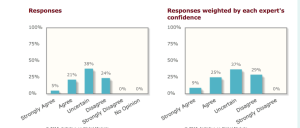Last month the University of Chicago’s Booth School of Business released the results of its latest survey of economists on the question of the minimum wage. In this post I focus only on the first question asked, which is:
If the federal minimum wage is raised gradually to $15-per-hour by 2020, the employment rate for low-wage US workers will be substantially lower than it would be under the status quo.
Here are the results (click to enlarge):

The good news is that only a minority – less than a quarter – of the surveyed economists disagree. And a greater percentage of the surveyed economists (26%) either agree or strongly agree that such a hike (of 107%) of the national minimum wage in the U.S. would substantially shrink the employment prospects of low-skilled workers.
The bad news is that 74 percent of these surveyed economists either disagreed, were “uncertain,” or expressed no opinion that such a huge hike in the minimum wage would cause substantial shrinkage of low-skilled workers’ job prospects.
What are these 74 percent of economists thinking?* What other goods or services – especially ones for which (like low-skilled workers) there are many substitutes – do these economists suppose can have its price forced by diktat to more than double without causing a substantial reduction in the quantity of that good or service demanded by buyers?
Suppose the question were not about the price of hours of low-skilled labor but instead, say, about the price of American-built commercial aircraft? Would 74 percent of my fellow economists either disagree that, be “uncertain” that, or have no opinion on the question of whether a forced 107 percent increase in the price of the likes of 737, 777, and 787 jetliners would cause airlines to cut back substantially on the number of new jetliners they buy from Boeing? Or what if the question were about the prices of fast-food? Would 74 percent of these economists either disagree that, be “uncertain” that, or have no opinion on the question of whether a forced 107 percent increase in the prices of the likes of Big Macs, Baconators, and buckets of KFC fried chicken would cause consumers to cut back substantially on the amount of food they purchase at fast-food restaurants?
It’s embarrassing, quite honestly, that so many prominent economists today are either so ideologically blinkered, so stupefied by empiricist dogma, or so innocent of basic price theory (or all three) that they cannot see (or bring themselves to admit) that a forced doubling of the price of low-skilled labor is sure to cause a substantial reduction in the amounts of such labor that employers purchase.
….
* Oliver Hart’s explanation for his answer (“Uncertain”) reveals that he didn’t quite get into the spirit of the question. He speculates that the Fed might “accommodate” such a minimum-wage hike with inflation. Well, maybe. But if so (1) such a minimum-wage hike is less valuable than advertised even for workers who remain employed, and, more to the point, (2) the survey question presumably is about a real 107 percent increase in the minimum wage on the employment prospects of low-skilled workers and not about how such a huge hike might alter Fed policy.



